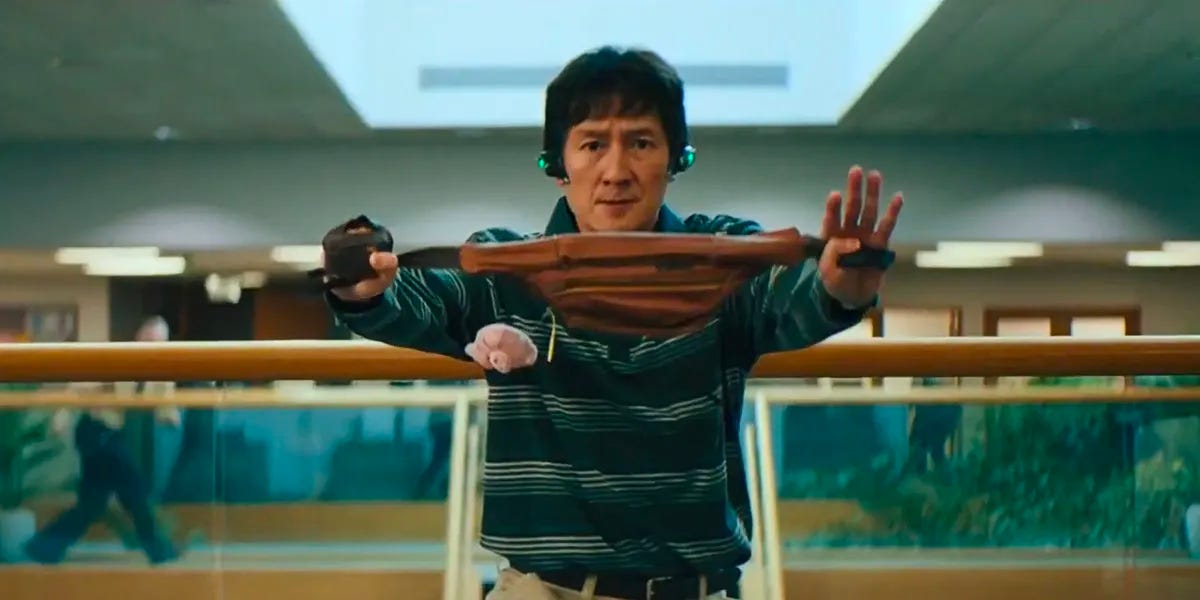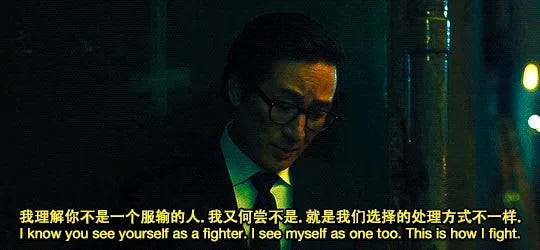Everything Everywhere All At Once, and the Battle Between Doomerism and Optimism
Be like Waymond. We like Waymond.
I’d like to tell you a story about two former friends I used to know, Jim and Ryan. It’s a sad story, but one worth telling. I’d also like to tell you about my new friend Waymond, if you have time. Let’s get started.
About Jim
Jim grew up in a small American town. There he encountered people who were dealt a bad hand in life. Economic turbulence, addiction, crime, loss of community and more. They were sad and angry. To better understand how these issues came to pass, Jim began to get more interested in the news. It seemed like Fox News was popular in his area, but that news was corporate, loved by his grandparents. The news also wasn’t changing. These factors led him to learn more about what was really going on.
About Ryan
Ryan grew up in your average American city. In this city, he often heard from angry people who had been dealt a bad hand in life. They too had hardships, stemming mostly from systemic issues. To understand these issues better, Ryan decided to pay attention to the news more. CNN was often trusted by those around him, but Ryan ran into the same problem. These talking heads weren’t talking about the real issues, and nothing was getting better. In fact, things were getting worse. These guys didn’t have the solutions, so Ryan would need to dig deeper.
Where Jim and Ryan both went wrong
In an honest search for answers and empathy, Jim and Ryan went down what’s become known as an Internet rabbit hole. Jim found Ben Shapiro, Tim Poole and Brietbart. Ryan found Jacobin, Hasan Piker and Chapo Trap House. These more modern online voices were quite popular with social media algorithms. Most of their success came from an ability to appeal to emotions and mock the other end of the ideological spectrum. In short, they were great at making guys like Jim strongly dislike guys like Ryan, and vice versa.
Those media figures convinced my friends that the solutions came from subjugating or ridiculing other opinions, rather than understanding them. Luckily, America is a big place. There are over 300 million of us, all with our own media interests, biases and ideas. Despite how all-encompassing these sources became for Jim and Ryan, the problems they saw around them persisted.
Unable to break the deadlock and see their solutions come to pass, they became “doomers.” Doomers represent our generation’s tendency for despair and nihilism. They are convinced that the world as we know it is destined to end in a terrible way. They come in all shapes and sizes and exist on the left and the right. There are AI doomers, climate change doomers, incel doomers and more. What unites them is a firm sense of certainty about their worldview, which often stems from a lack of diversity in their content diets.
It’s here that Jim and Ryan grew more and more frustrated with their inability to change what is coming. They sought out more extreme media programs and online communities that felt the same way. Some offered extreme solutions to society’s problems. Words like ‘revolution’ begin to be thrown around, and conspiracies become a place of comfort. After all, these solutions would explain why so many people in their towns were dealt a bad hand in life. It would also explain why nobody else is talking about the real issues!
My problem with Jim and Ryan was simple. Their newfound media sources made them feel comfortable, but in the process, they lost their ability to participate in a liberal democracy. They gave up on learning new things about the world. They gave up on voting. I could no longer have drinks with both of them at once. In fact, they didn’t like me hanging out with the other person at all.
We couldn’t even get to everyone’s dirtiest word: compromise. That was the word everyone hated most. In the span of a lifetime, it had become a dirty word, outing the speaker as some form of naive centrist or fence sitter. Both Jim and Ryan ended their relationship with me for this reason, which I still find a bit laughable. Regardless, I wish them well. In some ways, this helped me avoid a similar fate.
Instead of Jim and Ryan, be like Waymond
Waymond, you see, is an optimist. In the Oscar-winning film, Everything Everywhere All at Once, Waymond plays the role of a supportive husband who finds ways to be there for his family despite the selfishness, nihilism and otherworldly chaos around him. He is a vital character because he is reliable and steadfast when other characters lose hope.
The movie clearly has something to say about the importance of optimism. In 2022, it was a valuable message for a lot of people, myself included. We’ve all become surrounded by people like Jim and Ryan. Maybe you have been tempted to go down a similar path yourself. Climate change, economic uncertainty, geopolitical conflict and a looming AI apocalypse just to name a few. We all have plenty of reasons to lose hope. But what good does that do?
Waymond represented a different way to approach these issues. It didn’t matter if he was poor or overworked or his wife’s hands had turned into hot dogs. Waymond fought for what he cared about. Waymond was not above the fray. He did not place himself above people like Jim and Ryan. He fought for what he believed in, despite odds that seemed insurmountable.
"When I choose to see the good side of things, I'm not being naive. It is strategic snd necessary. It's how I learned to survive through everything." — Waymond
Optimism always defeats doomerism
Our perception is our reality. In the movie, Waymond wins. That’s what makes movies so enjoyable and inspiring. I recognize that may not always be the case in reality. The question is: who would you rather have on your side when tackling the issue you care most about? Would it be Jim, Ryan or Waymond? Your ideology may impact the rankings, but I would place Waymond above both of them every time.
As we continue to look at the power of media and the types of content we consume, Waymond’s perspective is important. Regardless of what we read or watch, we must not look solely for comfort, shallow victories or simple solutions. We must not retreat to our ideological fox holes, and then wonder why the battle for change has fallen to a standstill. We must look instead for solutions, understanding and community. We must discuss our hopes and ideas with others, especially those who disagree.
The issues that we all face are real, and most of them don’t change based on the media sources you consume. There are more things that unite us than divide us, despite what the most popular news platforms like to tell us. In Waymond’s footsteps, I am optimistic to see what becomes of the world when more of us realize what can be done together.



